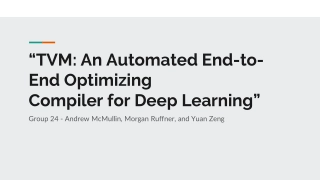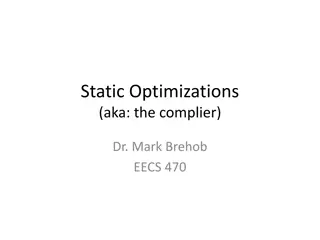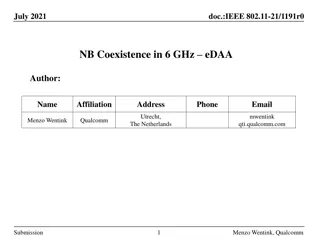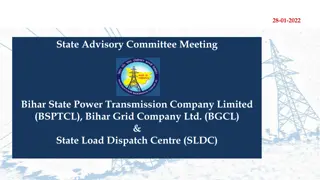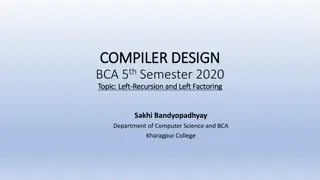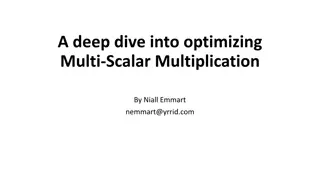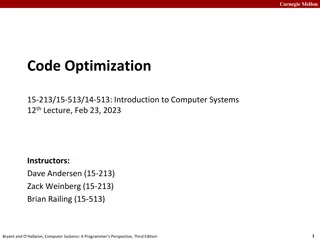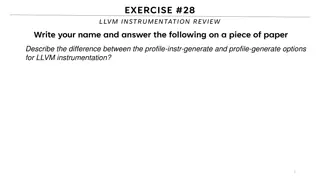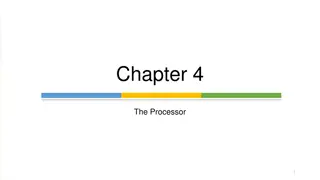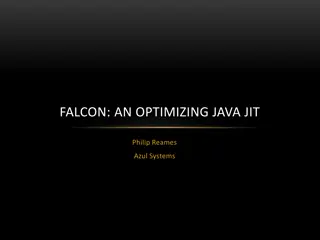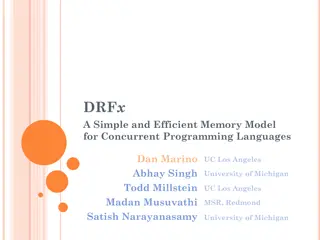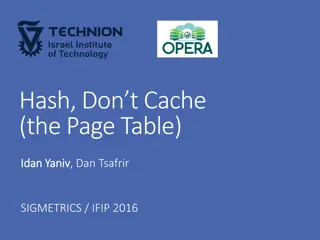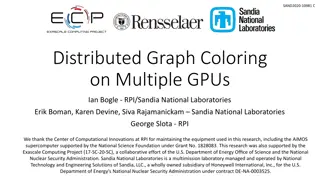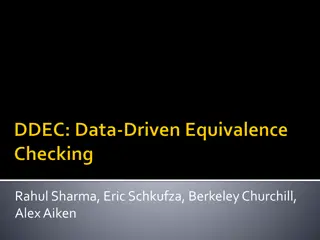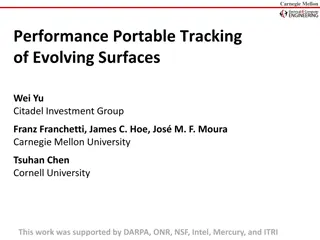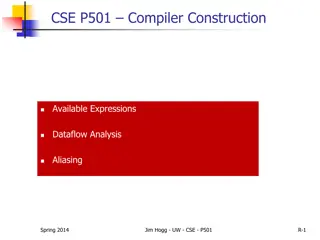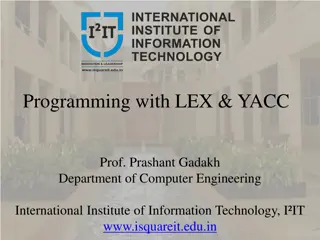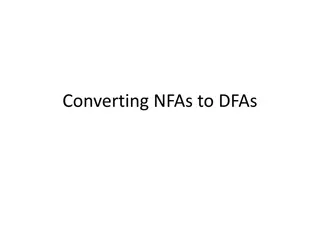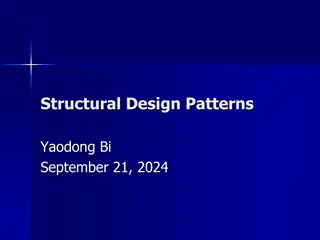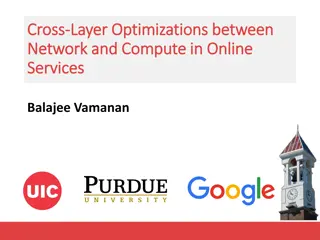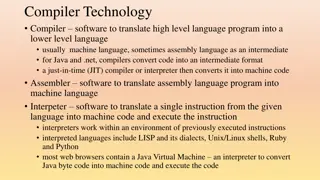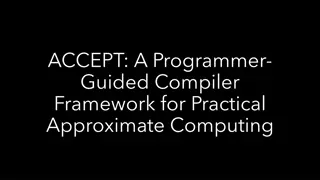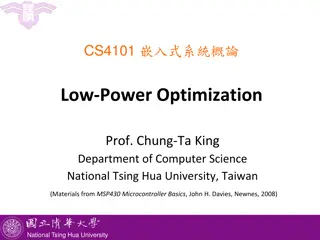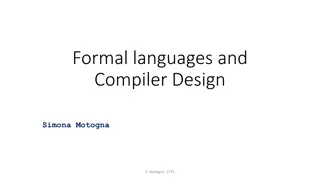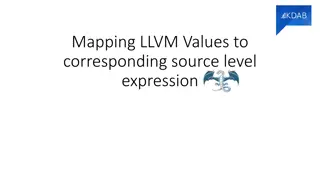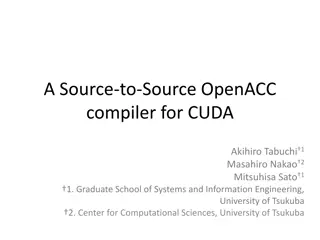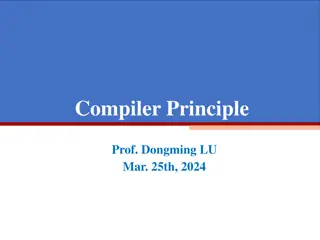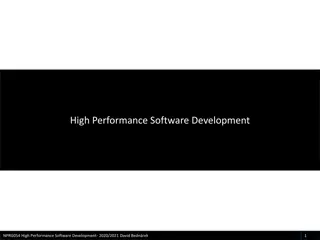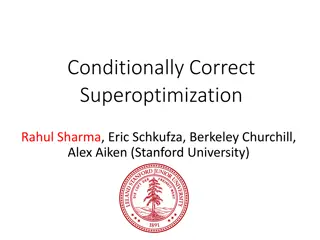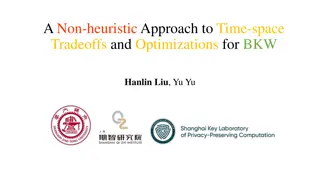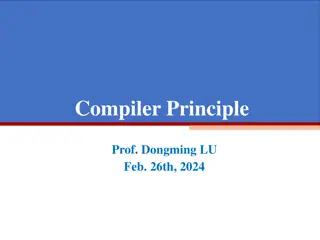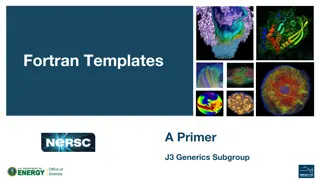TVM: An Automated End-to-End Optimizing Compiler for Deep Learning
TVM is a compiler that generates optimized code for diverse hardware back-ends from high-level specifications of deep learning programs, addressing the challenges of diverse hardware characteristics.
5 views • 16 slides
NNbar Annihilation Detector Mechanical Design Proposal
This proposal outlines the mechanical design considerations for the NNbar Annihilation Detector, highlighting practical concerns and proposed changes to the baseline design. Topics cover the structure support, component weights, installation challenges, and optimizations for improved detector perfor
2 views • 27 slides
Static Optimizations
Explore the fundamental concepts of static optimizations in hardware architecture, focusing on compiler-driven techniques to improve performance and efficiency. Learn how compilers can enhance data locality, reduce unnecessary instructions, and minimize branches executed. Discover strategies such as
0 views • 42 slides
New Drugs and Clinical Edits Overview in MO HealthNet Pharmacy Program
Explore the latest pharmaceutical additions and clinical edits in the MO HealthNet Pharmacy Program for various conditions like Fabry disease, cystic fibrosis, generalized myasthenia gravis, and more. Discover new medications such as Elfabrio, Kalydeco, Rystiggo, and Trikafta along with their indica
1 views • 19 slides
Understanding Memory Ordering in Programming
Memory ordering in programming is crucial for developers to understand, as it dictates the sequence of memory operations at different levels - source code, program order, and execution order. Compiler optimizations and reordering of memory accesses can impact how code is executed by the processor, e
1 views • 30 slides
Coexistence Challenges and Solutions in 6 GHz Networks
Various submissions address narrowband (NB) coexistence issues in the 6 GHz frequency band, focusing on Enhanced Detect and Avoid (eDAA) mechanisms to ensure harmonious coexistence between Wi-Fi and NB devices. The proposals discuss channel access rules, interference measurements, simulation results
1 views • 14 slides
Advisory Committee Meeting Summary for BSPTCL, BGCL & SLDC
The meeting discussed various topics including tariff petitions, business plans, network status, capacity additions, and cost optimizations for BSPTCL, BGCL, and SLDC in Bihar. Tariff projections, revenue requirements, transmission charges, and revenue surpluses were also analyzed and carried forwar
0 views • 23 slides
Understanding Left Recursion and Left Factoring in Compiler Design
Left recursion and left factoring are key concepts in compiler design to optimize parsing. Left recursion can be problematic for top-down parsers and needs to be eliminated using specific techniques. Left factoring is a method to resolve ambiguity in grammars with common prefixes, making them suitab
0 views • 15 slides
Efficient Gradient Boosting with LightGBM
Gradient Boosting Decision Tree (GBDT) is a powerful machine learning algorithm known for its efficiency and accuracy. However, handling big data poses challenges due to time-consuming computations. LightGBM introduces optimizations like Gradient-based One-Side Sampling (GOSS) and Exclusive Feature
0 views • 13 slides
Optimizing Multi-Scalar Multiplication Techniques
Delve into the world of optimizing multi-scalar multiplication techniques with a focus on improving performance, especially in Zero Knowledge Proofs systems using elliptic curves. Explore algorithmic optimizations like the Bucket Method by Gus Gutowski and learn about the runtime breakdown, motivati
3 views • 52 slides
Evolution of Compiler Optimization Techniques at Carnegie Mellon
Explore the rich history of compiler optimization techniques at Carnegie Mellon University, from the early days of machine code programming to the development of high-level languages like FORTRAN. Learn about key figures such as Grace Hopper, John Backus, and Fran Allen who revolutionized the field
0 views • 49 slides
Understanding the Difference Between LLVM Profile-Instr-Generate and Profile-Generate Options
The profile-instr-generate and profile-generate options in LLVM instrumentation serve distinct purposes. Profile-instr-generate generates instrumentation based on profiling data during compilation, aiding in performance optimization. In contrast, profile-generate is used to generate a profile based
1 views • 20 slides
Understanding Processor Speculation and Optimization
Dive into the world of processor speculation techniques and optimizations, including compiler and hardware support for speculative execution. Explore how speculation can enhance performance by guessing instruction outcomes and rolling back if needed. Learn about static and dynamic speculation, handl
0 views • 33 slides
Falcon: An Optimizing Java JIT Compiler Overview
Explore Falcon, an LLVM-based just-in-time compiler for Java bytecode developed by Azul Systems. Learn why using LLVM to build a JIT compiler is beneficial, address common objections, and dive into the technical and process lessons learned through its development timeline.
0 views • 66 slides
Enhancing Chapel Compiler with Interfaces and Semantic Changes
Explore the evolution of Chapel compiler with the integration of interfaces, semantic modifications, and improvements in error messages. Delve into the concepts of constrained generics, function call hijacking prevention, and the impact on compiler efficiency.
0 views • 30 slides
DRFx: A Simple and Efficient Memory Model for Concurrent Programming Languages
State-of-the-art memory model DRFx provides a solution for relaxed data race detection, addressing deficiencies of previous models like DRF0. It ensures safety, debuggability, and compiler correctness while permitting optimizations and halting programs before non-sequential consistency behavior.
3 views • 14 slides
Managing Large Graphs on Multi-Cores with Graph Awareness
This research discusses the challenges in managing large graphs on multi-core systems and introduces Grace, an in-memory graph management and processing system with optimizations for graph-specific and multi-core-specific operations. The system keeps the entire graph in memory in smaller parts and p
0 views • 14 slides
Insights into Virtual Memory Management Challenges
Exploring various aspects of virtual memory management, such as TLB misses, page table optimizations, and the role of hashed page tables, shedding light on the evolution and complexities of memory addressing in computing systems.
0 views • 51 slides
Update on ROOT I/O Workshop Efforts and Recent Additions
Efforts dedicated to improving ROOT software include memory management enhancements, caching advancements, and a new post-compile analyzer. Recent additions focus on memory leaks, TTree optimizations, and performance improvements for ROOT-based projects. Progress has been made towards zero-copy I/O
0 views • 11 slides
Distributed Graph Coloring on Multiple GPUs: Advancements in Parallel Computation
This research introduces a groundbreaking distributed memory multi-GPU graph coloring implementation, achieving significant speedups and minimal color increase. The approach enables efficient coloring of large-scale graphs with billions of vertices and edges. Additionally, the study explores the pra
0 views • 22 slides
Ensuring Equivalence in Compiler Optimization Programs
Explore the challenges of proving equivalence in compiler optimization programs, validate refactorings, and analyze the trustworthiness of compilers through binary equivalence testing. Learn about handling loops, utilizing decision procedures, and running tests to confirm program behavior.
0 views • 24 slides
Innovations in Performance Computing at Carnegie Mellon
Carnegie Mellon University is at the forefront of performance computing innovations, focusing on portable tracking of evolving surfaces, parallel and heterogeneous computing, software evolution, and compiler optimizations. They delve into the slow pace of change in programming languages, popular lib
0 views • 26 slides
Dataflow Analysis for Available Expressions in Compiler Construction
Utilizing dataflow analysis techniques, the concept of available expressions is discussed in the context of compiler construction. The goal is to identify common subexpressions that span basic blocks by calculating their availability at the beginning of each block. The process involves determining w
0 views • 59 slides
Introduction to Lex and Yacc: Compiler Design Essentials
Lex and Yacc are essential tools in compiler design. Lex serves as a lexical analyzer, converting source code to tokens, while Yacc is a parser generator that implements parsing based on BNF grammars. Through these tools, strings are processed, and code is generated for efficient compilation. This i
0 views • 10 slides
Compiler Data Structures and NFA to DFA Conversion
Compiler data structures play a crucial role in the compilation process, handling lexical analysis to code generation. Understanding the conversion from non-deterministic finite automata (NFA) to deterministic finite automata (DFA) is essential for efficient language processing and optimization.
0 views • 10 slides
Understanding Façade Design Pattern in Structural Design Patterns
Façade design pattern simplifies the interface of a complex system by providing a unified and straightforward interface for clients to access the system's functionalities. It helps in isolating the clients from the complexities of underlying components, offering a more user-friendly experience. The
0 views • 48 slides
Enhancing Cross-Layer Optimizations in Online Services
Research explores cross-layer optimizations between network and compute in online services to improve efficiency. It delves into challenges such as handling large data, network tail latency, and SLA budgets. The OLS software architecture, time-sensitive responses, and split budget strategies are dis
0 views • 29 slides
Overview of Compiler Technology and Related Terminology
Compiler technology involves software that translates high-level language programs into lower-level languages, such as machine or assembly language. It also covers decompilers, assemblers, interpreters, linkers, loaders, language rewriters, and preprocessing steps used in compilation. Understanding
0 views • 29 slides
ACCEPT: A Programmer-Guided Compiler Framework for Practical Approximate Computing
ACCEPT is an Approximate C Compiler framework that allows programmers to designate which parts of the code can be approximated for energy and performance trade-offs. It automatically determines the best approximation parameters, identifies safe approximation areas, and can utilize FPGA for hardware
0 views • 15 slides
Low-Power Optimization in MSP430 Microcontroller at National Tsing Hua University
This material discusses the significance of low-power optimization in modern devices, focusing on the MSP430 microcontroller features for energy efficiency. It covers topics such as energy conservation, power generation, and strategies for reducing power consumption at the device, circuit, and syste
0 views • 23 slides
Formal Languages and Compiler Design by Simona Motogna - Overview
This content provides an in-depth look into the course "Formal Languages and Compiler Design" by Simona Motogna. Covering topics such as compiler design, organization issues, history of programming languages, structure of a compiler, scanning techniques, and more. It also delves into the components
0 views • 18 slides
Understanding Compiler Optimizations in LLVM: Challenges and Solutions
Compiler optimizations in LLVM, such as loop vectorization, are crucial for enhancing program performance. However, understanding and addressing optimization challenges, like backward dependencies, can be complex. This article explores how LLVM values map to corresponding source-level expressions an
0 views • 41 slides
OpenACC Compiler for CUDA: A Source-to-Source Implementation
An open-source OpenACC compiler designed for NVIDIA GPUs using a source-to-source approach allows for detailed machine-specific optimizations through the mature CUDA compiler. The compiler targets C as the language and leverages the CUDA API, facilitating the generation of executable files.
0 views • 28 slides
Overview of Compiler Principle - Prof. Dongming LU
Introduction to compiler principles with a focus on lexical analysis, parsing, abstract syntax, semantic analysis, activation records, translating into intermediate code, and other key aspects related to bindings in the Tiger compiler. The content covers topics like semantic analysis, name spaces, t
0 views • 21 slides
High Performance Software Development - Topics and Related Lectures
This course on High Performance Software Development covers various topics such as modern programming styles, CPU properties, performance tuning, compiler optimization, memory hierarchy, and more. It also emphasizes the importance of using vector instructions within C/C++ for parallel programming. T
0 views • 10 slides
Superoptimization: Accelerating Code Performance through Conditional Correctness
Explore the concept of superoptimization, a technique to generate optimal code implementations for performance-critical systems. The process involves enumerating all possible programs, transforming them with loops, and proving equivalence with the original code. While optimizations are formally veri
0 views • 22 slides
Time-space Tradeoffs and Optimizations in BKW Algorithm
Time-space tradeoffs and optimizations play a crucial role in the BKW algorithm, particularly in scenarios like learning parity with noise (LPN) and BKW algorithm iterations. The non-heuristic approach in addressing these tradeoffs is discussed in relation to the hardness of the LPN problem and the
0 views • 14 slides
Understanding Atomics and Parallelism in Programming
Explore the world of atomics, parallelism, memory access optimizations, and sequential consistency in programming. Dive into concepts such as races in multithreading, cache optimizations, and the importance of memory access order before and after compiler optimizations. Witness live demos showcasing
0 views • 46 slides
Compiler Principle by Prof. Dongming LU: Overview and Phases
Compiler Principle course explores the translation of programming languages into executable code using techniques, data structures, and algorithms. The course covers modules, interfaces, and phases of a typical compiler, emphasizing the importance of abstract syntax and intermediate code. Key concep
0 views • 37 slides
Understanding Fortran Templates and Compiler-Driven Design Goals
Delve into the world of Fortran templates through a primer on generics, showcasing design goals set by the compiler. Explore syntax examples and motivating examples such as the AXPY subroutine, offering insight into the self-consistent nature of templates and their flexibility in parameter combinati
0 views • 9 slides
